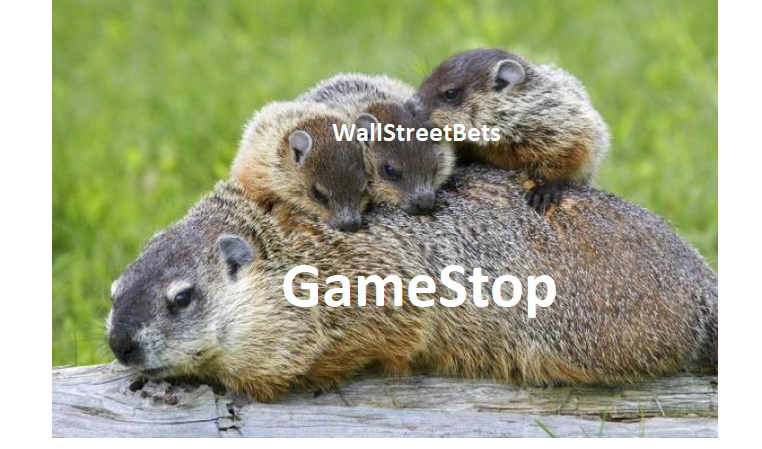SHI 2.3.21: The Irony is Thick

SHI 1.27.2021 – Dickensian Economics
January 27, 2021
SHI 2.10.21 – Inflation Hide and Seek
February 10, 2021You have to appreciate the irony.
In this oft-told story as old as time, the underdog takes on a far greater force. David vs. Goliath. The rag-tag American revolutionaries vs. the military might of England. And now, we have WSB — the 561,333 young whipper-snappers at ‘WallStreetBets’ conversing on reddit — taking on a few behemoth US hedge funds. And winning!
And where does the battle rage? Predominately on a stock trading platform named ‘Robinhood.’ You can cut the irony with a knife! Once again, a band of ‘misfits’ (at least in the eyes of Wall Street) has stolen from the rich and given to the poor — literally.
Hunter Kahn, a 20-year old college student from Michigan studying at Cornell cashed out about $30,000 from his brokerage account and GameStop winnings. He then promptly donated a whole bunch of Nintendo gaming consols, multiple games, and gift cards to the kids at a local children’s hospital valued at about $2,000. Hunter’s comment on Instagram: “As a beneficiary of the recent events on Wall Street, I think it is important that myself and others pay forward our good fortune. These events have highlighted a lot of corruption and with the transfer of power it i important that we don’t become the men in suits ourselves.”
That is one impressive 20-year old young man. And in the opposite corner:
“The victims in the failing GameStop experiment have and will continue to be the Robinhood investors storming the gates of capital markets without the size, the endgame plan, and the mathematical option pricing expertise to succeed,” bond investor Bill Gross said in a statement.
Thanks Bill. Nice suit.
According to the Wall Street Journal, hedge funds with short positions “have lost $23.6 billion this year in GameStop alone.” Holy canole! Which means the “other side” of the trade has made a similar amount — at least on paper. WSB’s band of rag-tag Robinhood traders certainly won round 1. And then gave money to kids in the hospital! Dude! Party on!
But in the final analysis, I fear Mr. Gross is essentially right. Only continued, relentless buying will keep GameStop and others at these lofty share price levels. Which cannot happen. Which means, ultimately, the game evolves into one of musical chairs.
“
Musical chairs. Shall we play?“
“Musical chairs. Shall we play?“
Unfortunately, some day soon, whether triggered by government decree, greed or something else, the music will stop. And then we will see the GameStop. (See what I did there? ) Game over.
Eventually, inevitably, something stronger than America’s love for the underdog will take hold: Gravity. And then, regardless of whom you’re rooting for, the price of this stock will plummet back to earth.
Welcome to this week’s Steak House Index update.
If you are new to my blog, or you need a refresher on the SHI10, or its objective and methodology, I suggest you open and read the original BLOG: https://www.steakhouseindex.com/move-over-big-mac-index-here-comes-the-steak-house-index/
Why You Should Care: The US economy and US dollar are the bedrock of the world’s economy.
But is the US economy expanding or contracting?
Before COVID-19, the world’s annual GDP was collectively about $85 trillion. Then it shrank … then bounced back! We can thank global fiscal and monetary policy for the bounce. According the the Q3, 2020 ‘preliminary’ numbers, annual US GDP is back UP to about $21.1 trillion. And still, together, the U.S., the EU and China continue to generate about 70% of the global economic output.
The objective of this blog is singular.
It attempts to predict the direction of our GDP ahead of official economic releases. Historically, ‘personal consumption expenditures,’ or PCE, has been the largest component of US GDP growth — typically about 2/3 of all GDP growth. In fact, the majority of all GDP increases (or declines) usually results from (increases or decreases in) consumer spending. Consumer spending is clearly a critical financial metric. In all likelihood, the most important financial metric. The Steak House Index focuses right here … on the “consumer spending” metric. I intend the SHI10 is to be predictive, anticipating where the economy is going – not where it’s been.
Taking action: Keep up with this weekly BLOG update. Not only will we cover the SHI and SHI10, but we’ll explore related items of economic importance.
If the SHI10 index moves appreciably -– either showing massive improvement or significant declines –- indicating growing economic strength or a potential recession, we’ll discuss possible actions at that time.
The Blog:
Perhaps, like the gang over at WSB, holding $23 billion of paper gains, you’re thinking:
No Way This Ends Badly.
Unfortunately, it must. Sorry.
When 2021 began, the stock price was about $17. On January 27th — less than one month later — if you wanted to buy one share of GameStop you would have to spend more than $400. A company valued by the public markets at about $200 million in April of 2020 was now “worth” more than $24 billion. In just 4 weeks.
Why did the per-share price increased by about 20X? Did GameStop solve the nuclear fusion puzzle? Did they figure out how to turn lead into gold?. Or better yet, can you convert GameStop into Bitcoin? Or — GASP! — something even more amazing? More phenomenal? Even more fundamentally earth-shattering?
Nope. By now, we all know the “short squeeze” story … and each of us has our opinion about who the true villains and victims are in the story. Regardless of your opinion, this has been a fascinating chapter in Wall Street’s evolution.
Does it qualify, somehow, as ‘market manipulation?’ After all, market manipulation has been illegal for years.
“The act of artificially inflating or deflating the price of a security
or otherwise influencing the behavior of the market for personal gain is illegal in most cases.”
Does this qualify? Is the “collusion” of about 1/2 million novice investors on a message board a new type of market manipulation? Is this episode simply a newer, more creative ‘Pump-and-Dump’? We’ve certainly seen plenty of pumping … but not much dumping. Regardless, have no doubt: The regulators are talking about this. A lot.
But until they render their opinion, you decide: 34 year old Keith Gill, recently highlighted in a recent Wall Street Journal article, sports the tag “Roaring Kitty” on YouTube. Grrrrrrrr!
Back in highschool and college, Keith was a track star. Today, per the WSJ, he’s an internet investment sensation. With potential ‘earnings’ in the eight figures, Keith plans to build an indoor race track facility in Brockton, Mass with his new-found wealth. “Keith is a legend at Brockton High School,” track coach John Fidalgo wrote in an email. “His personality as a runner was to throw the first punch if you will and never back down from any competition.”
That has been Keith’s approach in his extraordinary battle, sending GameStop’s price skyrocketing. He bought his first GameStop shares in June 2019. Its price was about $5. Eventually, according the ‘Wealthy Nickle’ and other on-line platforms, Keith invested a total of $53,566 in both the stock and call options. Then, on January 27, 2021, the “GME YOLO Update” from DeepF—ingValue showed his total account value just shy of $48 million, a 4,420% gain.
Damn. That’s impressive! Roaring Kitty indeed! Grrrrrrrr!
Reports suggest Keith still owns his positions. Can he sell? Or would selling subject him to SEC market manipulation regulations? Hmmm…..
According to a recent on-line post, when GME fell from a high of $497 to close at $197 a day or two later, Keith’s portfolio lost almost $15 million in a single day — on paper. But he continued to hold. “HE’S STILL IN, I’M STILL IN” is the rally cry on reddit.
But many traders are no longer “in.” Selling has started … and the stock price has begun it’s inevitable return to earth.
Ultimately, facts are facts, and the facts don’t seem to support the stock’s value. Consider the company’s prior five years P&L:

Yes, in the past 2 years, the company lost more than $1 billion. Further, consensus EPS estimates believe GameStop will lose ($2.10) per share in fiscal 2021 on revenue of about $5.5 billion, and will lose about ($.17) per share in fiscal 2022. And at the current lofty price, the company has a ‘price-t0-book’ ratio — the multiple of a company’s ‘net worth’ on its balance sheet — of over 60. Wow. Staggering. (By comparison, JP Morgan Chase has a price-to-book ratio of about 1.5.)
So, believe me when I say I’m a worried for Roaring Kitty. I really like kitties, so I fervently hope he sells all his stock soon, before all his gains are gone. Otherwise, I fear the story may end badly for him. Very badly. Meow. Then again, if he has any money left over after exiting GameStop, perhaps he can pile into Bitcoin. I hear it’s the next big thing. 🙂
The 2021 Economy and GDP
Moving to more meaningful, but far less entertaining news, the Congressional Budget Office is quite optimistic about the 2021 economy. In fact, even without additional fiscal stimulus, the CBO is forcasting a 4.6% ‘real’ GDP growth rate in 2021 … and a 6.3% nominal growth rate for 2021 GDP! Phenomenal! They expect 2.4% of the 4.6% to be generated by ‘consumer spending.’ This is consistent with historical experience. And they expect an additional 1.3% to come from net exports … and 0.9% from ‘Business Investment.’
Here are the newly released CBO summary forecast for GDP and inflation:

The US economy hasn’t seen a 4.6% growth rate in years. Sure, a big chunk of this outsized growth is a rebound from the (-3.5%) contraction in 2020, but, still, this would be an impressive accomplishment for our economy given all the headwinds. And remember, this forecast assumes no additional federal stimulus. Debate for additional stimulus continues between the Biden administration ($1.9 trillion) and a bi-partisan Republican group ($600 billion), either of which will be meaningfully accretive to GDP growth. In fact, the injection of another trillion or so into the 2021 economy would likely spur a 2021 GDP growth rate well above 5%.
On the other hand, the CBO believes inflation will remain very tame. In fact, they don’t expect the PCE to eclipse the 2% threshold until 2024 or 2025. Is it possible inflation will remain below 2% after all the fiscal and monetary stimulus? A great question … one we’ll continue to revisit in future blog posts.
The CBO forecast included a crystal ball look at unemployment and interest rates. Take a look:

I hope they’re right. If the United States can finish 2021 with a 5.7% unemployment rate, that will be a major accomplishment. Note their forecast for an ever-increasing 10-year Treasury rate. Interesting. I don’t agree. As I’ve said numerous times in prior blogs, I expect long term rates will remain at current levels for many, many years.
I would be remiss if I didn’t wish you a “Happy Groundhogs Day!” The introductory photo is a family of those cute little guys. Believe it or not, mom is actually named GameStop! 🙂
- Terry Liebman




